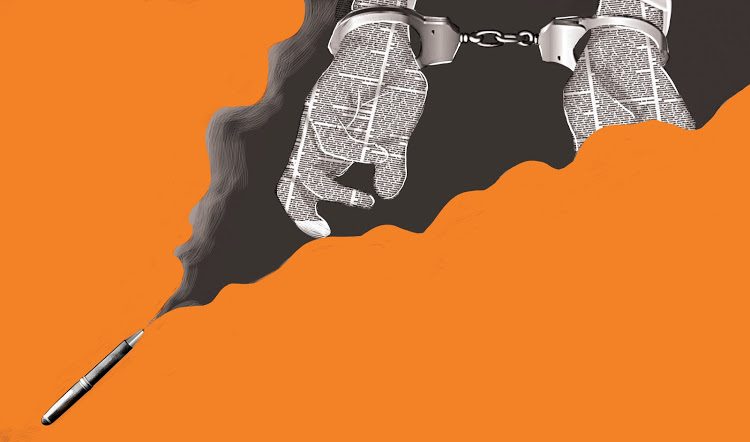

On July 15, 2020, the Journalists’ Union of Athens Daily Newspaper issued a statement expressing its opposition to defamation charges against journalist Thrasos Abraham which led to him being arrested and taken for questioning in Mytilene.
In March 2020, the journalist conducted an investigation and republished a video depicting an attack by extremists against a car containing humanitarian workers. Following the publication, the attackers pressed charges against the reporter for both defamation and violation of the law on personal data, subsequent to which the journalist was arrested in expedited proceedings.
“These actions can only be perceived as attempts to intimidate journalists and restrict their journalistic function. We call on all competent bodies to take action to protect targeted journalists and to ensure their ability to do their job,” concludes the announcement of the Union.
This lawsuit is situated within a wider problem with Greek legislation and the freedom of the press. Law 1178/81 regulates the basic legal framework of lawsuits against journalists and the media. The Journalists’ Union of Athens Daily Newspapers has called for its repeal, arguing that the law has created the legal basis for a lawsuit industry whose sole purpose is to silence the press and journalists. These lawsuits, they state, are essentially aimed at obstructing investigative journalism and at threatening the financial survival of the media and journalists.
According to Article 1 of law 1178/81, upon conviction the accused is obliged to pay full monetary compensation for material and non-material damages for a claim that affected the reputation and good name of a person provided that the claim was made with intent, fault or culpable ignorance by the author of the article or, if unknown, the publisher or the director of the media. According to paragraph 5, Article 1 of the same law, the wronged person must also, before filing a lawsuit, contact the author of the material in question, or if unknown, the publisher or editor, calling on them to print a retraction.
As such, the state must take immediate measures to protect against these abusive legal attacks. In fact, the need to adopt such measures is supported by both the European Commission and the European Parliament. The Commission is currently preparing a proposal for a directive to “protect journalists and human rights defenders in strategic lawsuits against public participation (SLAPP).”
In November 2021, the European Parliament also voted in favour of a report calling for new rules within the EU, “to counteract the threat that Strategic Lawsuits Against Public Participation (SLAPPs) pose to journalists, NGOs and civil society in Europe.” SLAPPs, they say, are frivolous legal actions based on exaggerated and often abusive claims, aiming to intimidate and professionally discredit their targets, with the ultimate objective of blackmailing and silencing them. Among the measures proposed by the European Parliament is the establishment of rules on early dismissal by the courts so that abusive lawsuits can be stopped quickly based on objective criteria; the claimant should face sanctions if they fail to justify in what way their action is not abusive.
In a state that adheres to the rule of law, both individual rights and the freedom of the press are protected. Journalists have the right to practice their work freely and independently, without censorship or influence.
Article 14 of the Constitution guarantees the freedom of the press, and the Journalists’ Union of Athens Daily Newspapers in this case expresses its opposition to a lawsuit filed against a journalist simply because he published a video as part of his journalistic investigation.
This case is part of a wider issue with Greek legislation, which fails to protect journalists and media organisations from Strategic Lawsuits against Public Participation (SLAPP), which harm the freedom of the press and aims to silence critical voices.
They call for the immediate adoption of measures to protect journalists, the media and members of civil society from abusive legal attacks against them, as advocated by the European Commission and the European Parliament.
Bank Account number: 1100 0232 0016 560
IBAN: GR56 0140 1100 1100 0232 0016 560
BIC: CRBAGRAA
![]()
In a time where the very foundations of democracy are gradually being eroded by the rise of extreme nationalism, alt-right movements, the spread of disinformation and corporate capture, the efforts of organisations such as Vouliwatch are more relevant than ever.
We rely on the generosity of each and every one of you to continue with our efforts for more transparency and accounta
By financially supporting Vouliwatch you support our litigation strategy, our campaigns for transparency and accountability in the political system, the development of new civic tech tools, our research projects and last but not least our impartial and accurate